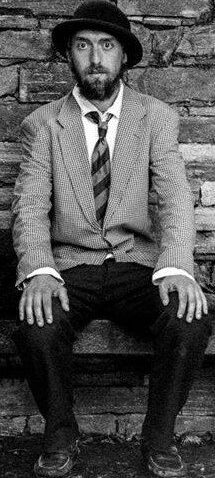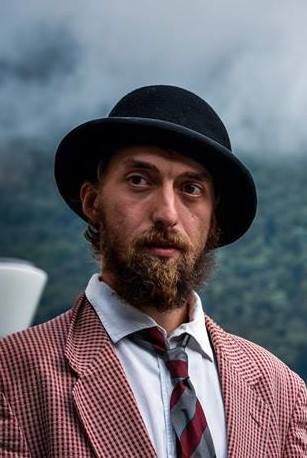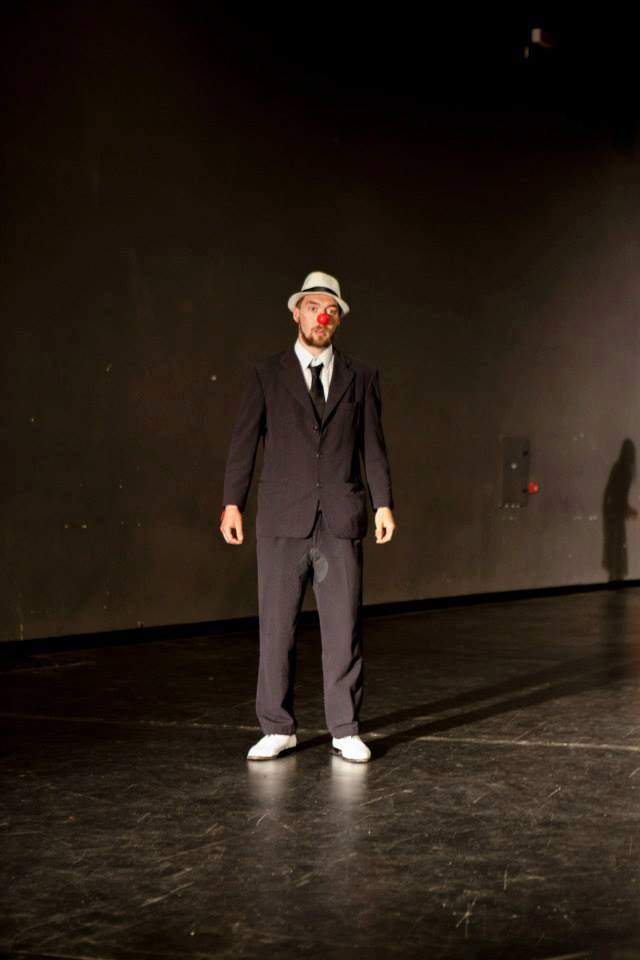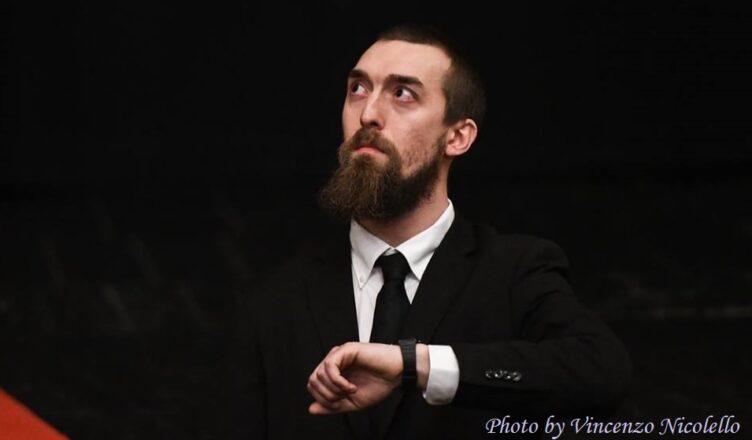by Alina ROINIȚĂ
Alessio Negro is technical director, clown, stuntman, set designer and co-founder of Teatro del Fiasco, Research Center and Theater Production of Contemporary Clown. Alessio is a young Italian artist passionate about art, knowledge, emotion, performance. As Pierre Byland would say: “Humour is like a windshield wiper: it doesn’t stop the rain, but it helps you get along better”.
1.I am very pleased to talk to you again, Alessio. I will start by asking you to describe your main occupation. I say main because I do know you have lots of projects on your plate.

First of all, thank you for this interview… I don’t have a main occupation, I like to collaborate with sundry partners, to get involved in various projects when it is necessary, to find myself in different situations and be surrounded by new people all the time. But I can say that I’m Member of the Culture Committee of the city of Canale and co-founder of Teatro del Fiasco, and in this period I’m designing a festival about the different perception of the city space and citizens. Also, at the moment, we have a new show, we are organizing the tour of this one, and I’m collaborator and assistant of the Burlesque Center-European Center for Research and Improvement of the Contemporary Burlesque Arts (Switzerland). Two weeks ago I have finished the harvest, a scenic installation for a foundation, and together with a friend we tried to write an international mobility project for young people. Furthermore, in this period I’m trying to share my idea of theater with a class of children and two classes of adults (I have to mention that I don’t like to say that I teach the art of theatre, but more I do share).
2.That is more than impressive. When did you discover your passion for theater?
The first approach was in Bosnia and Herzegovina in the summer of 2010. I was there as a volunteer for the Stranivari association with a summer camp for children. A collaborator of the project in that year was a theatre company. The very interesting fact is that the actors didn’t work in the theatre but in the street, and at the beginning I didn’t understand that was a performance. This group of actors arrived in Bosnia from Alba, a city which is 12 kilometers away from my little town. I had never met them before. In that period I was studying Architecture at the Artistic Lyceum, and by that time I was starting to realize that 8 hours a day in the front of the computer (I worked in an engineer studio) was a lot. I don’t remember how I got to perform with this group of actors if I ask them or they ask me, but one day I got out in the street without knowing what is necessary to do!? So I had to improvise. And it felt good. After that I started to study neutral mask and clandestine clown, and instead of Architecture, I have decided to go at the university to study Set design for theatre. At the beginning, everything started as a hobby, but in 2013 I have met Pierre Byland and he help me to change my life.
3.Is theater an art everyone should meet?
Since the time of the Ancient Greeks, the theater was a moment for the community, where learning, dialogue, and experiencing emotions that life „excluded” have met. For the same reasons, I will answer you YES, the theatre is an art that everyone should meet, at least as a spectator. For actors, the less known side is the way they use their body as a working tool, the same body they use it for different activities in life.
4.I know you have worked in a juvenile prison. Please describe that experience, this is not something very common.

Yes, I worked for six weeks in a juvenile prison, it started like a replacement actually, I had to replace the operator of the electrical system. On this subject, I did not have the right abilities, so I started working in the artistic field. At the beginning, it wasn’t easy at all, but it was very interesting for me, a total new point of view. I say that wasn’t easy because regarding the fact that defendants’ age and mine were similar, so it was difficult to create my authority. At first, I proposed the activity of painting or construction explaining to them that this is my job and doing this is possible to get a good life, to maintain your values, and to make money as well. But painting was boring for them, because in order to paint they were supposed to think too much. And during the activities they don’t want to think that long. Then, we started to share experiences and joke about these. After a while, I started to put myself at the level of the young defendants, and through a theatre lesson which topic was how to get public attention, I got their trust and we became „friends” on the stage. Then we all realized that they can find themselves on the stage as clowns, because they live on the borders and they stay in a corner since the rule in prison is: don’t see, don’t hear, don’t speak.
5.I do know you have a different perspective regarding theater pedagogy. What can you tell us about it?
Theater is like cheese: there are many types. In many languages, such as French (jouer), English (to play), German (spielen), Hungarian (játszik), the verb „to act” coincides with the verb „to play”. Instead, the Italian term, recitare, emphasizes the accent on fiction, on the repetition of gesture or word. If during a show you realize that the actor is acting, that definitely is not the way is supposed to be. As an act of imagination, just imagine a child when he plays cowboy: he is not doing the cowboy without thinking he is a real cowboy. My point is that it is necessary to be lively, natural. That is why it is necessary to play with yourself all the time. Each one of us experiences different feelings and emotions, gets angry, is happy, gets sick, or even experiences a ridiculous side of ourselves which we need to know and develop. I am sorry to say that we don’t know everything in the world, it’s frustrating, but we have to accept it; just like that, we can go back to marveling at the things around us, perceiving them. Earlier, I have told you that the meeting with Pierre Byland changed my life. He is my theatre master, but he taught me to see life from another point of view. Alongside his master, Jacques Lecoq, working in this art of Clowning, they created this pedagogy of Fiasco. Not the circus clown with make-up and big shoes (we use the red noise just like pedagogical help for immediately forget it), but a human being who wants to do good, but he doesn’t know how, and not knowing is something amazing that transforms in something stupid. Fiasco means failure. All of us, we are afraid of failing, but the clown must fail. This pedagogy, working on the human tragedy is an intense work on someone’s own person that has no end, because the research is always changing and what’s good today is not good tomorrow. Even if McDonald’s has a clown as a mascot, but this is not the clown we are talking about; our examples are Buster Keaton, Laurel & Hardy, or Charlie Chaplin.
6.What do you think it is the impact of theater on young people?

In order to guarantee a future for theater it is necessary to start to think how “get” to the young people. Theater, unlike cinema, television, radio, painting, sculpture, or architecture is a moment of shared life. Theatre gives you freedom, gives the possibility to break the patterns that society wants for us, serves to communicate its messages. Identifying yourself in someone else allows you to know him or her and his or her needs. Theater allows you to experience. And for the youngsters, all this is going to amplify.
7.Should theater be considered an educational art as well?
From my personal experience, I can tell you yes, absolutely, yes.
8.What stimulates you to do theater pedagogy?
I need to clarify that for the moment my idea is not to teach how to be a good actor on the stage, absolutely, this is not my goal. I use theater pedagogy to work on people, for self-awareness; awareness of someone’s body and someone’s own space. Everything stimulates me in this respect, my limits, my possibilities, my energy, my relationship with the others; because everything is about respect, listening, sharing; about the stupefaction amazement and the return to wonder; about new experiences and a different point of view. All these are here to make us better actors in life and in what we do. Working with various types of people, children, adults, foreigners, elderly or disabled people stimulates me to always look for new ways to communicate what I think, to understand the others and, of course, to understand myself.
9.Finally, do you think you can change something in the world through theater?
During a residential workshop with Jef Johnson, American philosopher and clown who worked as an artist and teacher at Cirque du Soleil and played in Slava’s Snowshow, we were eating breakfast, and the question was the same. I am going to tell you his answer. With a biscuit in hand, he said: „Do you think it’s really complicated to change the world? Look at this cookie!” Then he ate the biscuit. That cookie was gone and the world had changed.

